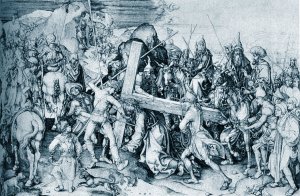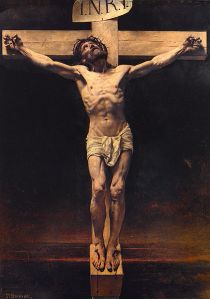One of my favorite Christmas carols is “God Rest Ye Merry, Gentlemen.” It’s an English carol with origins in the 19th century, so probably Anglican, but I won’t hold that against it. The first verse is as follows:
God rest ye merry, gentlemen,
Let nothing you dismay,
For Jesus Christ our Savior
Was born on Christmas Day,
To save us all from Satan’s power
When were gone astray:
O tidings of comfort and joy,
Comfort and joy,
O tidings of comfort and joy.
The idea of God and comfort has been running around in my mind for well over a month. When I had my conversion to the Catholic Church, I probably went overboard. I felt perhaps that I needed to prove myself to God, to show myself worthy, or something. And so I indulged in fasting, traditional observances of holy days, night watchings, etc. Not that any of these are bad, but if undertaken for the wrong reason, that is, not for love, they are.
And so God became, or maybe already was, an authority figure whose approval I had to gain through novenas, fasting, Little Office, rosaries, adherence to traditional practices…actions. My spiritual actions were a check-list, while what He desires is relationship. Fasting out of love. Rosaries because I wanted to spend time with Him. But I didn’t get that (nor have I yet completely). God was demanding, exacting, just. How could I ever measure up?
What I’m beginning to learn is that He is Love. Sure, He’s just. Saying God is Love doesn’t mean it’s okay to go on sinning, to go on doing what we want to because God will love us anyway. He loves me when I sin, but if I choose to continue in my sin, to ignore His Love that calls me to Himself and perfection, He will, in His Love, give me what I have chosen–a life without Him.
Even in the Old Testament, when God seems to be a God of wrath and destruction (context, people) He exclaims through Isaiah: “Comfort, comfort my people, says your God. Speak tenderly to Jerusalem, and cry to her that her warfare is ended, that her iniquity is pardoned” (40.1). And, “I, I am he that comforts you” (51.12). And in the passage that Jesus reads aloud in the Nazareth synagogue (Lk. 4.16-21), “The Spirit of the Lord is upon me….to comfort all who mourn” (Is. 61.1-2). In the last chapter of Isaiah, God compares himself to a mother who comforts her child, “As one whom his mother comforts, so I will comfort you; you shall be comforted in Jerusalem” (66.13).
David says to God in the Psalms: “I fear no evil; for thou art with me; thy rod and thy staff, they comfort me” (23.4). And again: “Show me a sign of thy favor…because thou, Lord, hast helped me and comforted me” (86.17). And “Let they steadfast love be ready to comfort me (119.76).
The prophet Jeremiah, speaking of the fulfillment of God’s promise, prophesies, “I will turn their mourning into joy, I will comfort them, and give them gladness for sorrow” (31.13). The minor prophet Zechariah also speaks of this future happiness, “Cry again, Thus says the Lord of hosts: My cities shall again overflow with prosperity, and the Lord will again comfort Zion and again choose Jerusalem” (1.17).
Jesus fulfilled these prophetic words when He said in the Sermon on the Mount, “Blessed are those who mourn, for they shall be comforted” (Matt. 5.4).
But what started all this thinking about God and the concept of comfort was my reading of 2 Corinthians. St. Paul calls God “the Father of mercies and God of all comfort, who comforts us in all our affliction” (1.3-4). Why does He comfort us? Well, because He is a Father to us and “so that we may be able to comfort those who are in any affliction, with the comfort with which we ourselves are comforted by God” (1.4). He goes on to use “comfort” many more times in the letter, but the other examples are how we are to act as comforters to each other.
In his second letter to the Thessalonians, St. Paul again mentions God as a God of comfort when he says, “Now may our Lord Jesus Christ himself, and God our Father, who loved us and gave us eternal comfort and good hope through grace, comfort your hearts and establish them in every good work and word” (2.16-17).
So there it is. God is a Father who comforts us. From the Old Testament right through the early Church, it is repeated again and again. God comforts His people. That’s not to say He desires our lives to be easy! No, he knows that “suffering produces endurance, and endurance produces character, and character produces hope, and hope does not disappoint us, because God’s love has been poured into our hearts through the Holy Spirit who has been given to us” (Rom. 5.3-5). Jesus did not promise His followers a life of ease and comfort in the modern sense–a state of physical ease and freedom from pain or constraint. He says, “Take my yoke upon you” (Matt. 11.29); “If any man would come after me, let him deny himself, and take up his cross and follow me” (Matt. 16.24); “In the world you have tribulation” (John 16.33). But He also promises “My yoke is easy, and my burden is light” (Matt. 11.30); “Be of good cheer, I have overcome the world” (John 16.33).
I can take comfort in that.




